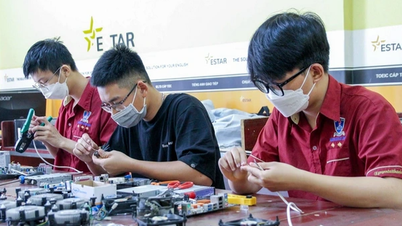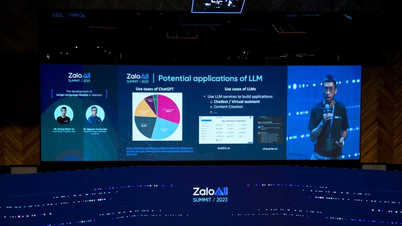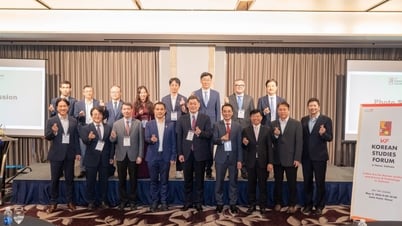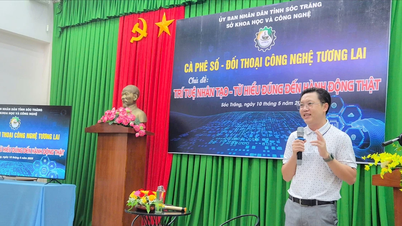In the context of rapid development of digital technology, Vietnam is facing a great opportunity to break through and affirm its position on the world technology map. However, the gap in high-quality human resources in the fields of cloud computing and artificial intelligence (AI) is becoming a significant challenge.
Vietnam and the challenge of narrowing the digital gap
Cloud computing and AI are global trends, playing a key role in driving economic growth and innovation. According to McKinsey's 2023 forecast, the global data center market will grow 10% annually through 2030, with total spending reaching $49 billion.
Not only cloud computing, AI technology, especially Generative AI, is also growing rapidly. Most technologies take 2-4 years to become popular. However, Generative AI only needs 12 months to do this.
In Vietnam, a report published in early 2024 showed that the size of the cloud computing services market will reach more than 1.2 billion USD by 2030, with an expected growth rate of 11-12% per year.

Despite having the fastest growth rate in Southeast Asia and ranking third in Asia in 2023 (up 19%), the size of Vietnam's cloud computing market is still only 1/15th of Singapore's and 1/5th of Indonesia and Malaysia's. This shows that Vietnam still has a lot of work to do to catch up with other countries in the region.
One of the digital gaps that needs to be bridged is the shortage of highly skilled workers in the fields of cloud computing and AI. To fill the workforce gap, Vietnam needs to focus on upgrading the skills of its workers.
In fact, digital human resources are also a common problem for many Asian countries. According to Mr. Jeff Johnson, General Director of Amazon Web Services (AWS) ASEAN, Generative AI has the potential to change many businesses, causing 10% of organizations and businesses to commit to investing.
However, despite aiming to increase AI capabilities, 70% of companies in the Asia-Pacific region said they are lacking skilled workers in this area.

“ There is a huge gap in the skilled workforce in cloud computing and AI in Vietnam. What Vietnam needs to do is to upgrade the skills of its workers, and work with employers in both the public and private sectors to improve digital skills,” Emmanuel Pillai, AWS ASEAN Training & Certifications Director, told VietNamNet.
Adding another perspective, Nguyen Huy Dinh, a cloud data engineer at a joint stock commercial bank, said that the salary of cloud computing engineers in Vietnam is currently 10-20% lower than in other countries in the Southeast Asian region. The main reason is the difference in living standards between countries.
However, when asked to share more, this expert said: " Self-study skills, openness and quick adaptation to new jobs are important factors that help Vietnamese engineers compete in the international market ."
Developing digital talent to shape Vietnam's digital future
The talent gap in cloud computing and AI is a big challenge, but also an opportunity for Vietnam to shape its own digital future.
At the AWS Cloud Day Vietnam event held on September 18, Mr. Ho Duc Thang, Acting Director of the National Digital Transformation Agency (Ministry of Information and Communications) said that digital transformation is reshaping the world. Governments, businesses and society are increasingly relying on cloud technology and data infrastructure to promote economic growth, optimize services and innovate.

The National Digital Transformation Agency considers cloud computing and AI as essential elements in its mission. By applying cloud computing and AI, Vietnam is enhancing the capacity of state agencies to manage and use data more effectively, accelerating Vietnam's journey towards a digital future.
According to Acting Director General Ho Duc Thang, cloud computing now plays a key role in digital transformation, providing systems that are more scalable, adaptive and efficient. By adopting cloud solutions, organizations can innovate faster and respond quickly to market demands.
Artificial intelligence (AI) also plays a key role in digital transformation. In addition to automating processes and improving operational efficiency, AI has the potential to revolutionize public services and optimize government functions.
In fact, Vietnam has begun integrating AI into the public sector, applying it in smart cities and providing virtual assistants to civil servants and citizens.
The Acting Director of the National Digital Transformation Agency emphasized that, not only stopping at applying technologies, Vietnam is prioritizing the development of digital skills and AI skills for the workforce.
Digital talent will ensure that technologies such as AI and Generative AI drive innovation, efficiency and sustainability for Vietnam's economy.

'Attracting' foreign currency from the AI human resource gold mine With great potential from a young and creative workforce, Vietnam is facing a golden opportunity to become a supplier of quality AI human resources.
Source: https://vietnamnet.vn/bung-no-dien-toan-dam-may-va-ai-viet-nam-lieu-da-san-sang-2323574.html



































![[Photo] General Secretary To Lam meets with Chairman of the Federation Council, Parliament of the Russian Federation](https://vphoto.vietnam.vn/thumb/1200x675/vietnam/resource/IMAGE/2025/5/10/2c37f1980bdc48c4a04ca24b5f544b33)
![[Photo] Ho Chi Minh City: Many people release flower lanterns to celebrate Buddha's Birthday](https://vphoto.vietnam.vn/thumb/1200x675/vietnam/resource/IMAGE/2025/5/10/5d57dc648c0f46ffa3b22a3e6e3eac3e)



































































Comment (0)